Analysis of the Contemporary Hospitality Industry at Nelson College
VerifiedAdded on 2023/01/10
|10
|2729
|2
Report
AI Summary
This report provides a detailed analysis of the contemporary hospitality industry, focusing on various aspects such as the different types of businesses (food and beverage, accommodation, travel and tourism), operational and functional departments (front office, housekeeping, sales & marketing, acc...
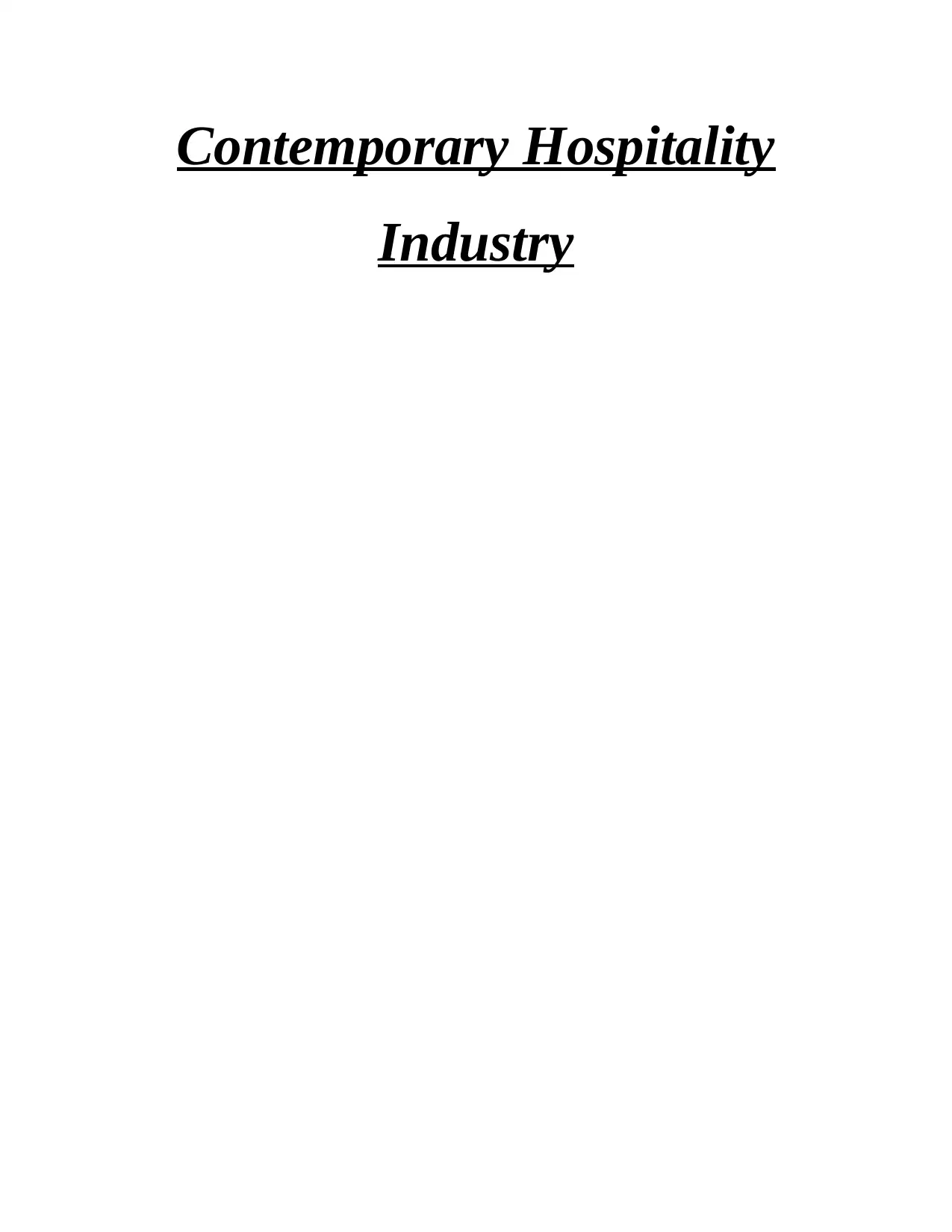
Contemporary Hospitality
Industry
Industry
Paraphrase This Document
Need a fresh take? Get an instant paraphrase of this document with our AI Paraphraser
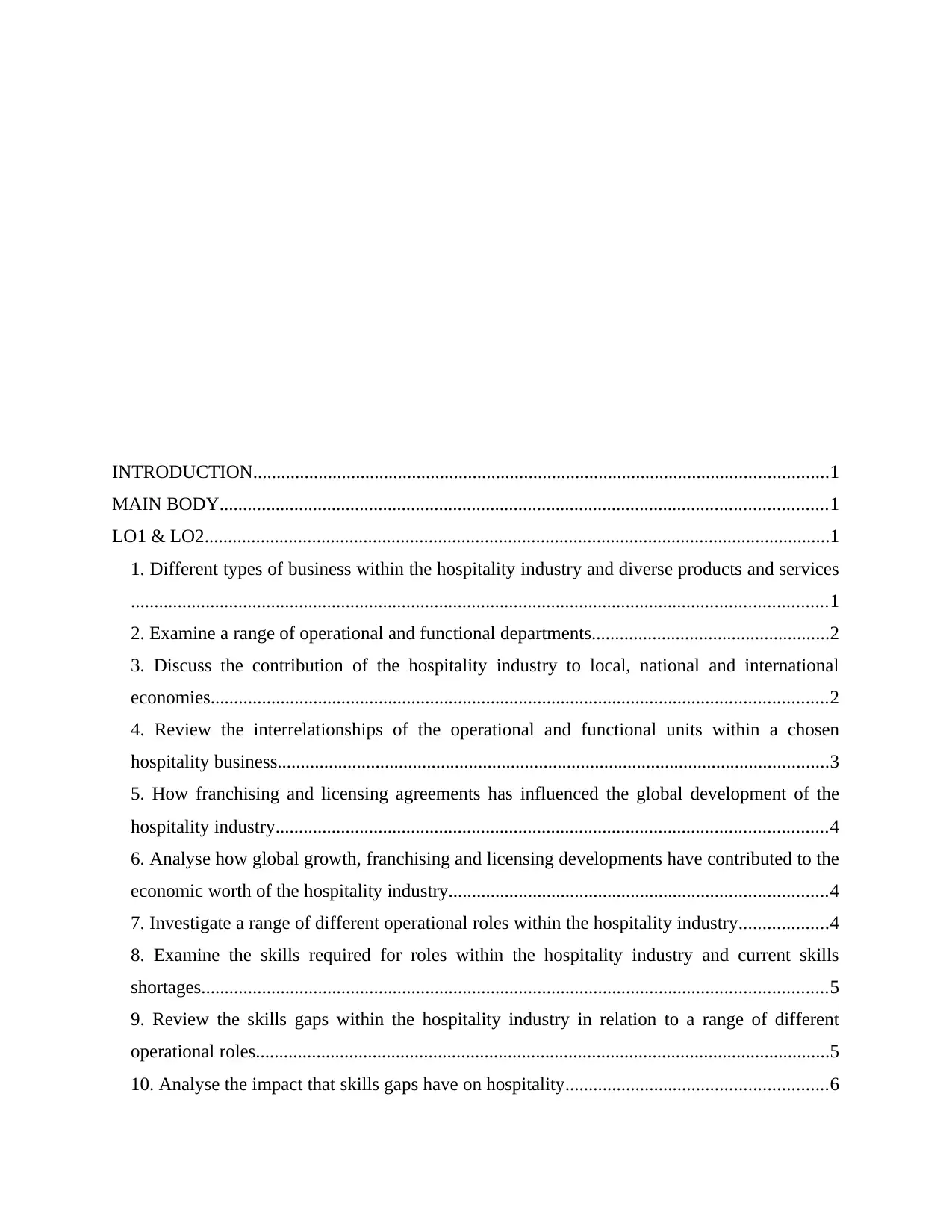
INTRODUCTION...........................................................................................................................1
MAIN BODY..................................................................................................................................1
LO1 & LO2......................................................................................................................................1
1. Different types of business within the hospitality industry and diverse products and services
.....................................................................................................................................................1
2. Examine a range of operational and functional departments...................................................2
3. Discuss the contribution of the hospitality industry to local, national and international
economies....................................................................................................................................2
4. Review the interrelationships of the operational and functional units within a chosen
hospitality business......................................................................................................................3
5. How franchising and licensing agreements has influenced the global development of the
hospitality industry......................................................................................................................4
6. Analyse how global growth, franchising and licensing developments have contributed to the
economic worth of the hospitality industry.................................................................................4
7. Investigate a range of different operational roles within the hospitality industry...................4
8. Examine the skills required for roles within the hospitality industry and current skills
shortages......................................................................................................................................5
9. Review the skills gaps within the hospitality industry in relation to a range of different
operational roles...........................................................................................................................5
10. Analyse the impact that skills gaps have on hospitality........................................................6
MAIN BODY..................................................................................................................................1
LO1 & LO2......................................................................................................................................1
1. Different types of business within the hospitality industry and diverse products and services
.....................................................................................................................................................1
2. Examine a range of operational and functional departments...................................................2
3. Discuss the contribution of the hospitality industry to local, national and international
economies....................................................................................................................................2
4. Review the interrelationships of the operational and functional units within a chosen
hospitality business......................................................................................................................3
5. How franchising and licensing agreements has influenced the global development of the
hospitality industry......................................................................................................................4
6. Analyse how global growth, franchising and licensing developments have contributed to the
economic worth of the hospitality industry.................................................................................4
7. Investigate a range of different operational roles within the hospitality industry...................4
8. Examine the skills required for roles within the hospitality industry and current skills
shortages......................................................................................................................................5
9. Review the skills gaps within the hospitality industry in relation to a range of different
operational roles...........................................................................................................................5
10. Analyse the impact that skills gaps have on hospitality........................................................6
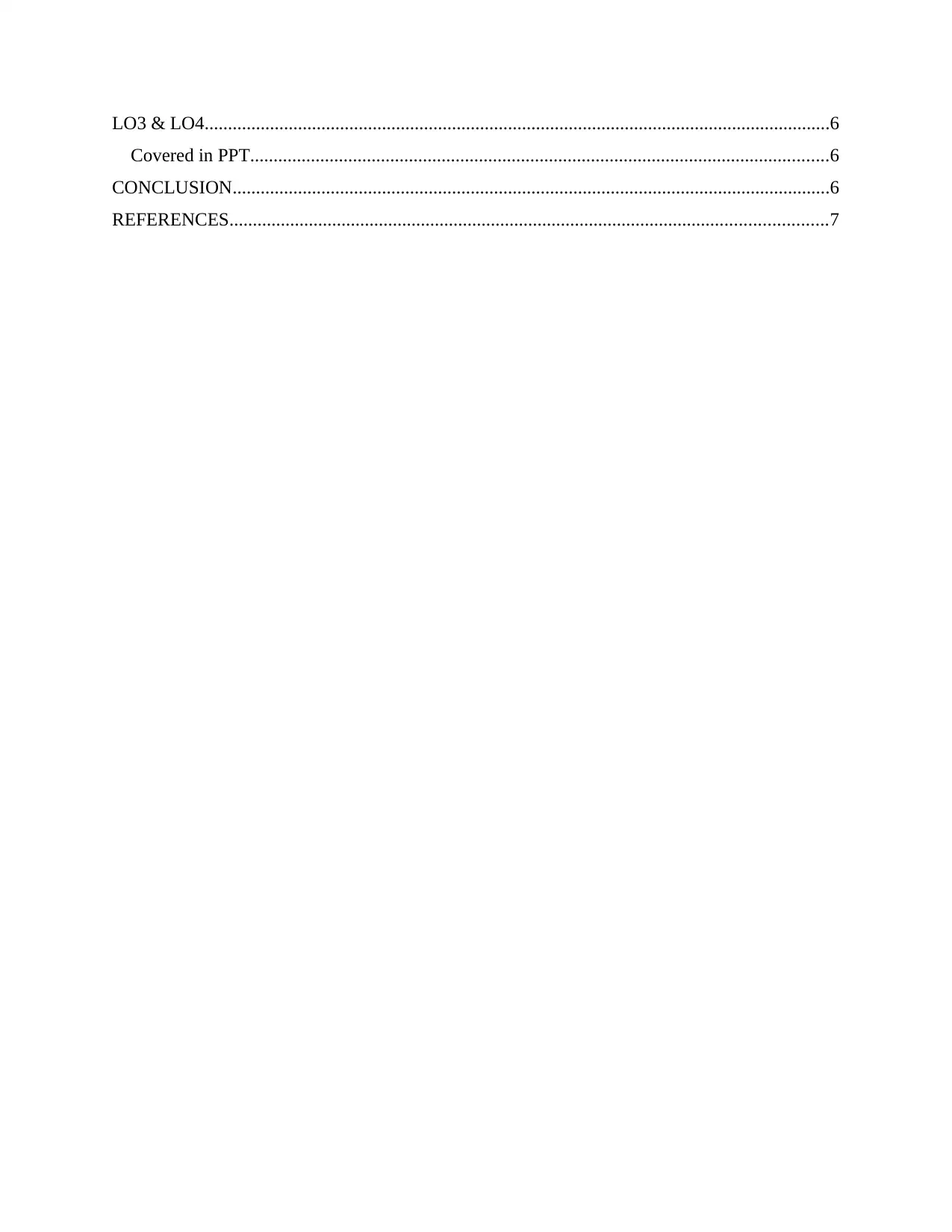
LO3 & LO4......................................................................................................................................6
Covered in PPT............................................................................................................................6
CONCLUSION................................................................................................................................6
REFERENCES................................................................................................................................7
Covered in PPT............................................................................................................................6
CONCLUSION................................................................................................................................6
REFERENCES................................................................................................................................7
⊘ This is a preview!⊘
Do you want full access?
Subscribe today to unlock all pages.

Trusted by 1+ million students worldwide
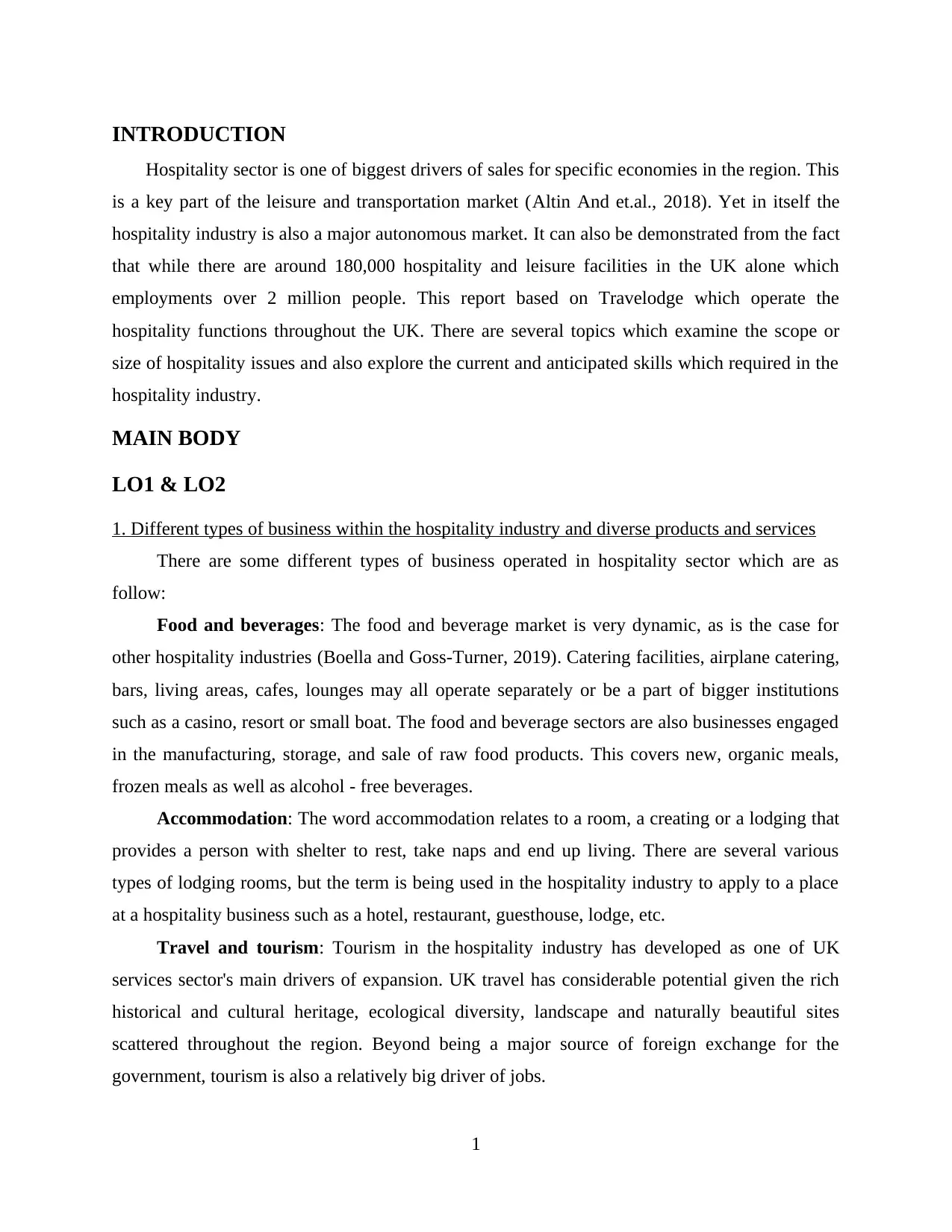
INTRODUCTION
Hospitality sector is one of biggest drivers of sales for specific economies in the region. This
is a key part of the leisure and transportation market (Altin And et.al., 2018). Yet in itself the
hospitality industry is also a major autonomous market. It can also be demonstrated from the fact
that while there are around 180,000 hospitality and leisure facilities in the UK alone which
employments over 2 million people. This report based on Travelodge which operate the
hospitality functions throughout the UK. There are several topics which examine the scope or
size of hospitality issues and also explore the current and anticipated skills which required in the
hospitality industry.
MAIN BODY
LO1 & LO2
1. Different types of business within the hospitality industry and diverse products and services
There are some different types of business operated in hospitality sector which are as
follow:
Food and beverages: The food and beverage market is very dynamic, as is the case for
other hospitality industries (Boella and Goss-Turner, 2019). Catering facilities, airplane catering,
bars, living areas, cafes, lounges may all operate separately or be a part of bigger institutions
such as a casino, resort or small boat. The food and beverage sectors are also businesses engaged
in the manufacturing, storage, and sale of raw food products. This covers new, organic meals,
frozen meals as well as alcohol - free beverages.
Accommodation: The word accommodation relates to a room, a creating or a lodging that
provides a person with shelter to rest, take naps and end up living. There are several various
types of lodging rooms, but the term is being used in the hospitality industry to apply to a place
at a hospitality business such as a hotel, restaurant, guesthouse, lodge, etc.
Travel and tourism: Tourism in the hospitality industry has developed as one of UK
services sector's main drivers of expansion. UK travel has considerable potential given the rich
historical and cultural heritage, ecological diversity, landscape and naturally beautiful sites
scattered throughout the region. Beyond being a major source of foreign exchange for the
government, tourism is also a relatively big driver of jobs.
1
Hospitality sector is one of biggest drivers of sales for specific economies in the region. This
is a key part of the leisure and transportation market (Altin And et.al., 2018). Yet in itself the
hospitality industry is also a major autonomous market. It can also be demonstrated from the fact
that while there are around 180,000 hospitality and leisure facilities in the UK alone which
employments over 2 million people. This report based on Travelodge which operate the
hospitality functions throughout the UK. There are several topics which examine the scope or
size of hospitality issues and also explore the current and anticipated skills which required in the
hospitality industry.
MAIN BODY
LO1 & LO2
1. Different types of business within the hospitality industry and diverse products and services
There are some different types of business operated in hospitality sector which are as
follow:
Food and beverages: The food and beverage market is very dynamic, as is the case for
other hospitality industries (Boella and Goss-Turner, 2019). Catering facilities, airplane catering,
bars, living areas, cafes, lounges may all operate separately or be a part of bigger institutions
such as a casino, resort or small boat. The food and beverage sectors are also businesses engaged
in the manufacturing, storage, and sale of raw food products. This covers new, organic meals,
frozen meals as well as alcohol - free beverages.
Accommodation: The word accommodation relates to a room, a creating or a lodging that
provides a person with shelter to rest, take naps and end up living. There are several various
types of lodging rooms, but the term is being used in the hospitality industry to apply to a place
at a hospitality business such as a hotel, restaurant, guesthouse, lodge, etc.
Travel and tourism: Tourism in the hospitality industry has developed as one of UK
services sector's main drivers of expansion. UK travel has considerable potential given the rich
historical and cultural heritage, ecological diversity, landscape and naturally beautiful sites
scattered throughout the region. Beyond being a major source of foreign exchange for the
government, tourism is also a relatively big driver of jobs.
1
Paraphrase This Document
Need a fresh take? Get an instant paraphrase of this document with our AI Paraphraser
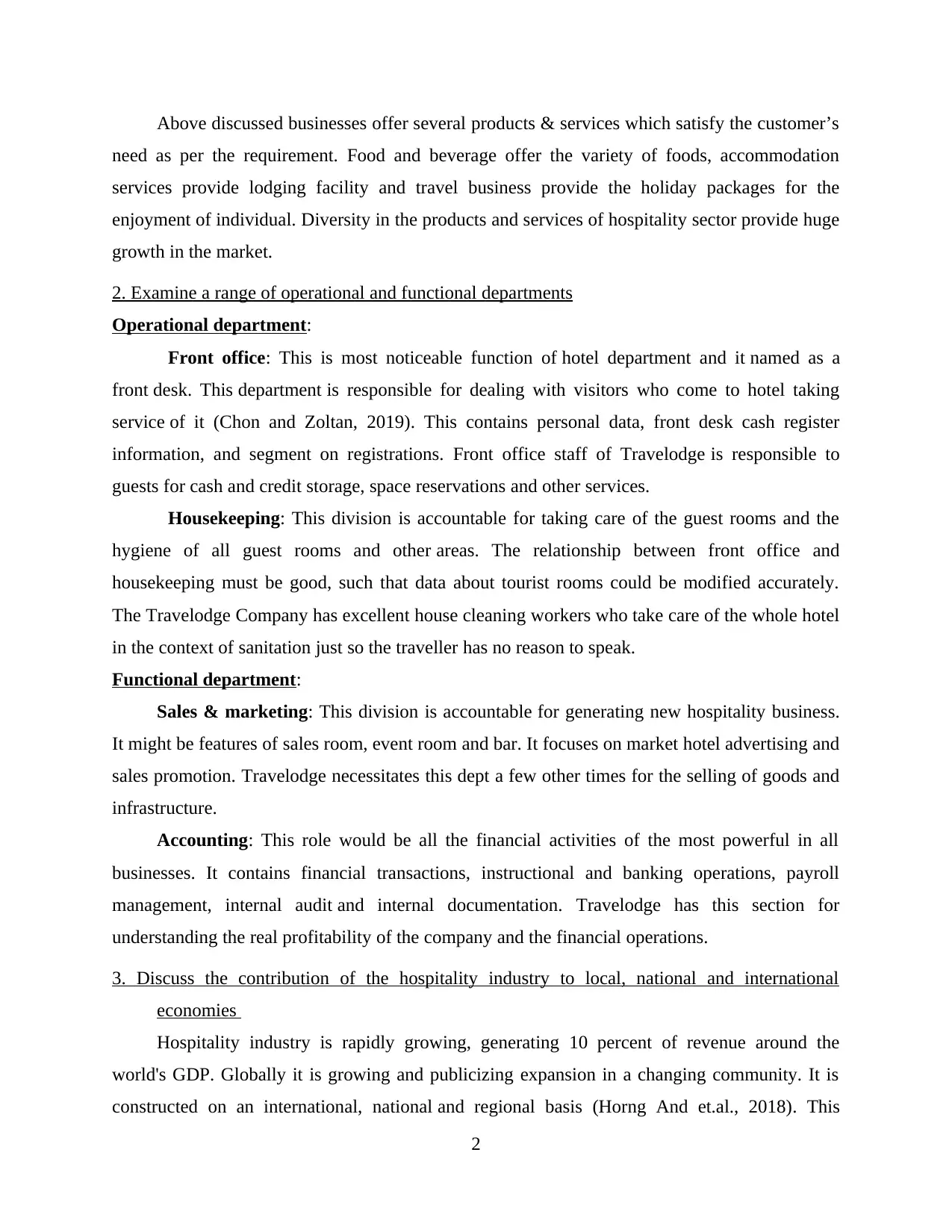
Above discussed businesses offer several products & services which satisfy the customer’s
need as per the requirement. Food and beverage offer the variety of foods, accommodation
services provide lodging facility and travel business provide the holiday packages for the
enjoyment of individual. Diversity in the products and services of hospitality sector provide huge
growth in the market.
2. Examine a range of operational and functional departments
Operational department:
Front office: This is most noticeable function of hotel department and it named as a
front desk. This department is responsible for dealing with visitors who come to hotel taking
service of it (Chon and Zoltan, 2019). This contains personal data, front desk cash register
information, and segment on registrations. Front office staff of Travelodge is responsible to
guests for cash and credit storage, space reservations and other services.
Housekeeping: This division is accountable for taking care of the guest rooms and the
hygiene of all guest rooms and other areas. The relationship between front office and
housekeeping must be good, such that data about tourist rooms could be modified accurately.
The Travelodge Company has excellent house cleaning workers who take care of the whole hotel
in the context of sanitation just so the traveller has no reason to speak.
Functional department:
Sales & marketing: This division is accountable for generating new hospitality business.
It might be features of sales room, event room and bar. It focuses on market hotel advertising and
sales promotion. Travelodge necessitates this dept a few other times for the selling of goods and
infrastructure.
Accounting: This role would be all the financial activities of the most powerful in all
businesses. It contains financial transactions, instructional and banking operations, payroll
management, internal audit and internal documentation. Travelodge has this section for
understanding the real profitability of the company and the financial operations.
3. Discuss the contribution of the hospitality industry to local, national and international
economies
Hospitality industry is rapidly growing, generating 10 percent of revenue around the
world's GDP. Globally it is growing and publicizing expansion in a changing community. It is
constructed on an international, national and regional basis (Horng And et.al., 2018). This
2
need as per the requirement. Food and beverage offer the variety of foods, accommodation
services provide lodging facility and travel business provide the holiday packages for the
enjoyment of individual. Diversity in the products and services of hospitality sector provide huge
growth in the market.
2. Examine a range of operational and functional departments
Operational department:
Front office: This is most noticeable function of hotel department and it named as a
front desk. This department is responsible for dealing with visitors who come to hotel taking
service of it (Chon and Zoltan, 2019). This contains personal data, front desk cash register
information, and segment on registrations. Front office staff of Travelodge is responsible to
guests for cash and credit storage, space reservations and other services.
Housekeeping: This division is accountable for taking care of the guest rooms and the
hygiene of all guest rooms and other areas. The relationship between front office and
housekeeping must be good, such that data about tourist rooms could be modified accurately.
The Travelodge Company has excellent house cleaning workers who take care of the whole hotel
in the context of sanitation just so the traveller has no reason to speak.
Functional department:
Sales & marketing: This division is accountable for generating new hospitality business.
It might be features of sales room, event room and bar. It focuses on market hotel advertising and
sales promotion. Travelodge necessitates this dept a few other times for the selling of goods and
infrastructure.
Accounting: This role would be all the financial activities of the most powerful in all
businesses. It contains financial transactions, instructional and banking operations, payroll
management, internal audit and internal documentation. Travelodge has this section for
understanding the real profitability of the company and the financial operations.
3. Discuss the contribution of the hospitality industry to local, national and international
economies
Hospitality industry is rapidly growing, generating 10 percent of revenue around the
world's GDP. Globally it is growing and publicizing expansion in a changing community. It is
constructed on an international, national and regional basis (Horng And et.al., 2018). This
2
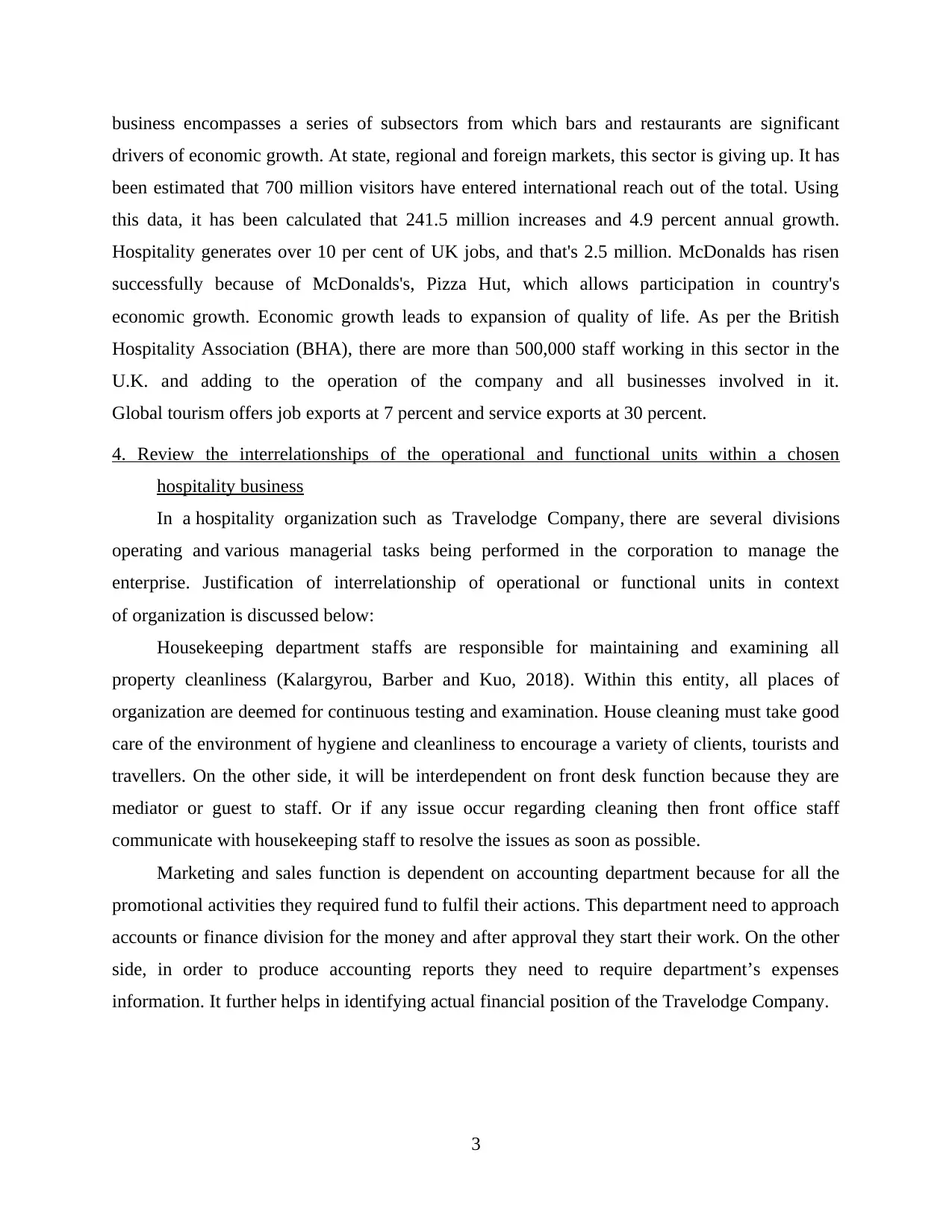
business encompasses a series of subsectors from which bars and restaurants are significant
drivers of economic growth. At state, regional and foreign markets, this sector is giving up. It has
been estimated that 700 million visitors have entered international reach out of the total. Using
this data, it has been calculated that 241.5 million increases and 4.9 percent annual growth.
Hospitality generates over 10 per cent of UK jobs, and that's 2.5 million. McDonalds has risen
successfully because of McDonalds's, Pizza Hut, which allows participation in country's
economic growth. Economic growth leads to expansion of quality of life. As per the British
Hospitality Association (BHA), there are more than 500,000 staff working in this sector in the
U.K. and adding to the operation of the company and all businesses involved in it.
Global tourism offers job exports at 7 percent and service exports at 30 percent.
4. Review the interrelationships of the operational and functional units within a chosen
hospitality business
In a hospitality organization such as Travelodge Company, there are several divisions
operating and various managerial tasks being performed in the corporation to manage the
enterprise. Justification of interrelationship of operational or functional units in context
of organization is discussed below:
Housekeeping department staffs are responsible for maintaining and examining all
property cleanliness (Kalargyrou, Barber and Kuo, 2018). Within this entity, all places of
organization are deemed for continuous testing and examination. House cleaning must take good
care of the environment of hygiene and cleanliness to encourage a variety of clients, tourists and
travellers. On the other side, it will be interdependent on front desk function because they are
mediator or guest to staff. Or if any issue occur regarding cleaning then front office staff
communicate with housekeeping staff to resolve the issues as soon as possible.
Marketing and sales function is dependent on accounting department because for all the
promotional activities they required fund to fulfil their actions. This department need to approach
accounts or finance division for the money and after approval they start their work. On the other
side, in order to produce accounting reports they need to require department’s expenses
information. It further helps in identifying actual financial position of the Travelodge Company.
3
drivers of economic growth. At state, regional and foreign markets, this sector is giving up. It has
been estimated that 700 million visitors have entered international reach out of the total. Using
this data, it has been calculated that 241.5 million increases and 4.9 percent annual growth.
Hospitality generates over 10 per cent of UK jobs, and that's 2.5 million. McDonalds has risen
successfully because of McDonalds's, Pizza Hut, which allows participation in country's
economic growth. Economic growth leads to expansion of quality of life. As per the British
Hospitality Association (BHA), there are more than 500,000 staff working in this sector in the
U.K. and adding to the operation of the company and all businesses involved in it.
Global tourism offers job exports at 7 percent and service exports at 30 percent.
4. Review the interrelationships of the operational and functional units within a chosen
hospitality business
In a hospitality organization such as Travelodge Company, there are several divisions
operating and various managerial tasks being performed in the corporation to manage the
enterprise. Justification of interrelationship of operational or functional units in context
of organization is discussed below:
Housekeeping department staffs are responsible for maintaining and examining all
property cleanliness (Kalargyrou, Barber and Kuo, 2018). Within this entity, all places of
organization are deemed for continuous testing and examination. House cleaning must take good
care of the environment of hygiene and cleanliness to encourage a variety of clients, tourists and
travellers. On the other side, it will be interdependent on front desk function because they are
mediator or guest to staff. Or if any issue occur regarding cleaning then front office staff
communicate with housekeeping staff to resolve the issues as soon as possible.
Marketing and sales function is dependent on accounting department because for all the
promotional activities they required fund to fulfil their actions. This department need to approach
accounts or finance division for the money and after approval they start their work. On the other
side, in order to produce accounting reports they need to require department’s expenses
information. It further helps in identifying actual financial position of the Travelodge Company.
3
⊘ This is a preview!⊘
Do you want full access?
Subscribe today to unlock all pages.

Trusted by 1+ million students worldwide
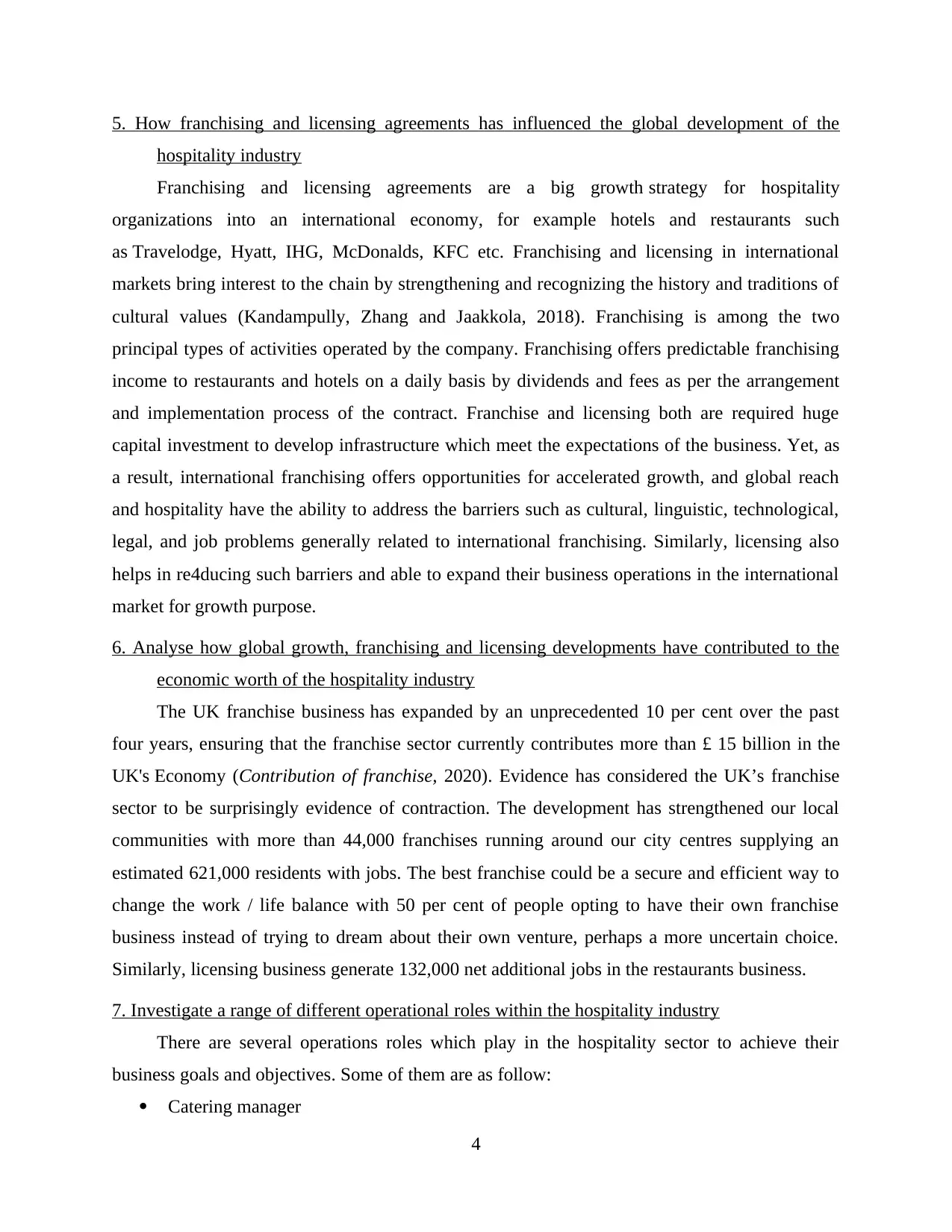
5. How franchising and licensing agreements has influenced the global development of the
hospitality industry
Franchising and licensing agreements are a big growth strategy for hospitality
organizations into an international economy, for example hotels and restaurants such
as Travelodge, Hyatt, IHG, McDonalds, KFC etc. Franchising and licensing in international
markets bring interest to the chain by strengthening and recognizing the history and traditions of
cultural values (Kandampully, Zhang and Jaakkola, 2018). Franchising is among the two
principal types of activities operated by the company. Franchising offers predictable franchising
income to restaurants and hotels on a daily basis by dividends and fees as per the arrangement
and implementation process of the contract. Franchise and licensing both are required huge
capital investment to develop infrastructure which meet the expectations of the business. Yet, as
a result, international franchising offers opportunities for accelerated growth, and global reach
and hospitality have the ability to address the barriers such as cultural, linguistic, technological,
legal, and job problems generally related to international franchising. Similarly, licensing also
helps in re4ducing such barriers and able to expand their business operations in the international
market for growth purpose.
6. Analyse how global growth, franchising and licensing developments have contributed to the
economic worth of the hospitality industry
The UK franchise business has expanded by an unprecedented 10 per cent over the past
four years, ensuring that the franchise sector currently contributes more than £ 15 billion in the
UK's Economy (Contribution of franchise, 2020). Evidence has considered the UK’s franchise
sector to be surprisingly evidence of contraction. The development has strengthened our local
communities with more than 44,000 franchises running around our city centres supplying an
estimated 621,000 residents with jobs. The best franchise could be a secure and efficient way to
change the work / life balance with 50 per cent of people opting to have their own franchise
business instead of trying to dream about their own venture, perhaps a more uncertain choice.
Similarly, licensing business generate 132,000 net additional jobs in the restaurants business.
7. Investigate a range of different operational roles within the hospitality industry
There are several operations roles which play in the hospitality sector to achieve their
business goals and objectives. Some of them are as follow:
Catering manager
4
hospitality industry
Franchising and licensing agreements are a big growth strategy for hospitality
organizations into an international economy, for example hotels and restaurants such
as Travelodge, Hyatt, IHG, McDonalds, KFC etc. Franchising and licensing in international
markets bring interest to the chain by strengthening and recognizing the history and traditions of
cultural values (Kandampully, Zhang and Jaakkola, 2018). Franchising is among the two
principal types of activities operated by the company. Franchising offers predictable franchising
income to restaurants and hotels on a daily basis by dividends and fees as per the arrangement
and implementation process of the contract. Franchise and licensing both are required huge
capital investment to develop infrastructure which meet the expectations of the business. Yet, as
a result, international franchising offers opportunities for accelerated growth, and global reach
and hospitality have the ability to address the barriers such as cultural, linguistic, technological,
legal, and job problems generally related to international franchising. Similarly, licensing also
helps in re4ducing such barriers and able to expand their business operations in the international
market for growth purpose.
6. Analyse how global growth, franchising and licensing developments have contributed to the
economic worth of the hospitality industry
The UK franchise business has expanded by an unprecedented 10 per cent over the past
four years, ensuring that the franchise sector currently contributes more than £ 15 billion in the
UK's Economy (Contribution of franchise, 2020). Evidence has considered the UK’s franchise
sector to be surprisingly evidence of contraction. The development has strengthened our local
communities with more than 44,000 franchises running around our city centres supplying an
estimated 621,000 residents with jobs. The best franchise could be a secure and efficient way to
change the work / life balance with 50 per cent of people opting to have their own franchise
business instead of trying to dream about their own venture, perhaps a more uncertain choice.
Similarly, licensing business generate 132,000 net additional jobs in the restaurants business.
7. Investigate a range of different operational roles within the hospitality industry
There are several operations roles which play in the hospitality sector to achieve their
business goals and objectives. Some of them are as follow:
Catering manager
4
Paraphrase This Document
Need a fresh take? Get an instant paraphrase of this document with our AI Paraphraser
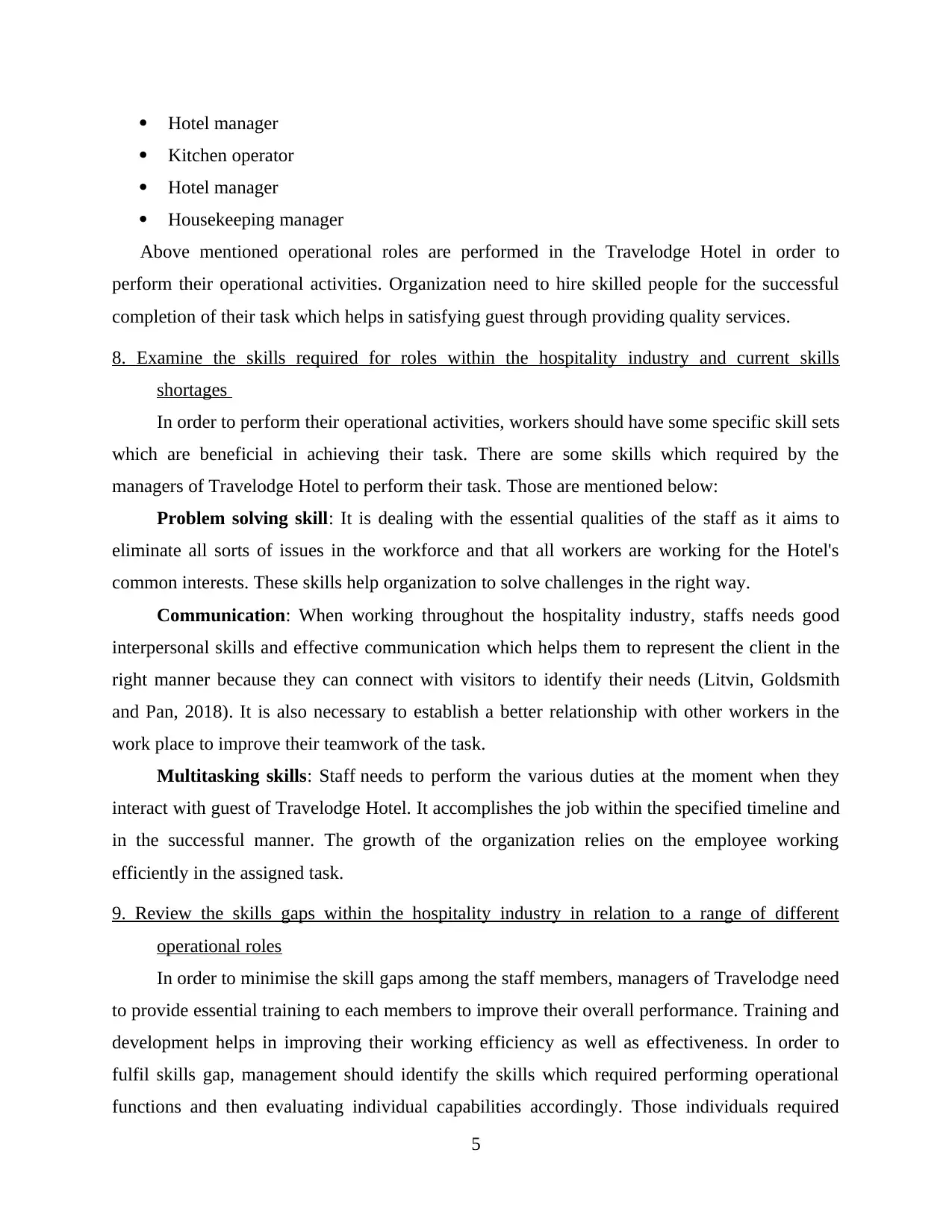
Hotel manager
Kitchen operator
Hotel manager
Housekeeping manager
Above mentioned operational roles are performed in the Travelodge Hotel in order to
perform their operational activities. Organization need to hire skilled people for the successful
completion of their task which helps in satisfying guest through providing quality services.
8. Examine the skills required for roles within the hospitality industry and current skills
shortages
In order to perform their operational activities, workers should have some specific skill sets
which are beneficial in achieving their task. There are some skills which required by the
managers of Travelodge Hotel to perform their task. Those are mentioned below:
Problem solving skill: It is dealing with the essential qualities of the staff as it aims to
eliminate all sorts of issues in the workforce and that all workers are working for the Hotel's
common interests. These skills help organization to solve challenges in the right way.
Communication: When working throughout the hospitality industry, staffs needs good
interpersonal skills and effective communication which helps them to represent the client in the
right manner because they can connect with visitors to identify their needs (Litvin, Goldsmith
and Pan, 2018). It is also necessary to establish a better relationship with other workers in the
work place to improve their teamwork of the task.
Multitasking skills: Staff needs to perform the various duties at the moment when they
interact with guest of Travelodge Hotel. It accomplishes the job within the specified timeline and
in the successful manner. The growth of the organization relies on the employee working
efficiently in the assigned task.
9. Review the skills gaps within the hospitality industry in relation to a range of different
operational roles
In order to minimise the skill gaps among the staff members, managers of Travelodge need
to provide essential training to each members to improve their overall performance. Training and
development helps in improving their working efficiency as well as effectiveness. In order to
fulfil skills gap, management should identify the skills which required performing operational
functions and then evaluating individual capabilities accordingly. Those individuals required
5
Kitchen operator
Hotel manager
Housekeeping manager
Above mentioned operational roles are performed in the Travelodge Hotel in order to
perform their operational activities. Organization need to hire skilled people for the successful
completion of their task which helps in satisfying guest through providing quality services.
8. Examine the skills required for roles within the hospitality industry and current skills
shortages
In order to perform their operational activities, workers should have some specific skill sets
which are beneficial in achieving their task. There are some skills which required by the
managers of Travelodge Hotel to perform their task. Those are mentioned below:
Problem solving skill: It is dealing with the essential qualities of the staff as it aims to
eliminate all sorts of issues in the workforce and that all workers are working for the Hotel's
common interests. These skills help organization to solve challenges in the right way.
Communication: When working throughout the hospitality industry, staffs needs good
interpersonal skills and effective communication which helps them to represent the client in the
right manner because they can connect with visitors to identify their needs (Litvin, Goldsmith
and Pan, 2018). It is also necessary to establish a better relationship with other workers in the
work place to improve their teamwork of the task.
Multitasking skills: Staff needs to perform the various duties at the moment when they
interact with guest of Travelodge Hotel. It accomplishes the job within the specified timeline and
in the successful manner. The growth of the organization relies on the employee working
efficiently in the assigned task.
9. Review the skills gaps within the hospitality industry in relation to a range of different
operational roles
In order to minimise the skill gaps among the staff members, managers of Travelodge need
to provide essential training to each members to improve their overall performance. Training and
development helps in improving their working efficiency as well as effectiveness. In order to
fulfil skills gap, management should identify the skills which required performing operational
functions and then evaluating individual capabilities accordingly. Those individuals required
5
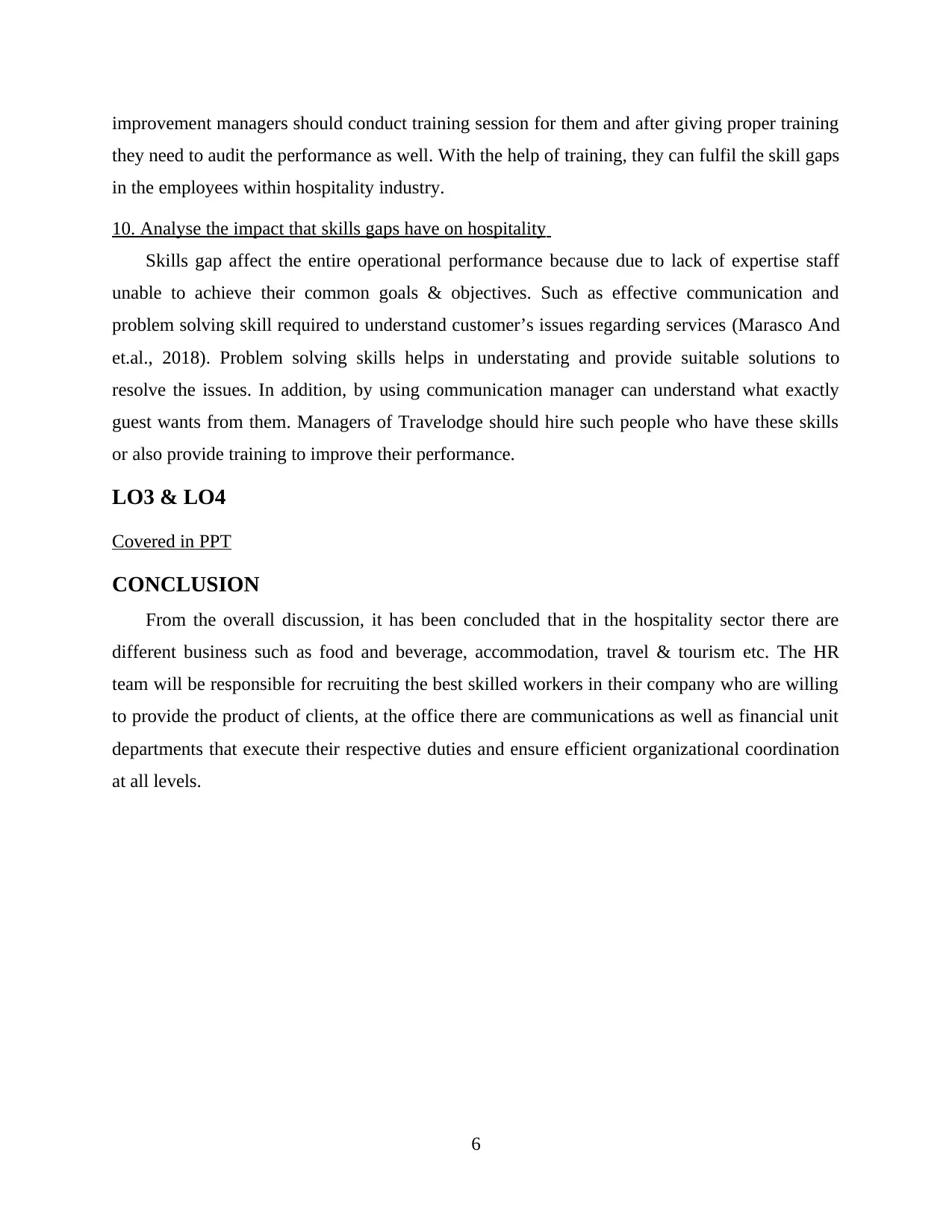
improvement managers should conduct training session for them and after giving proper training
they need to audit the performance as well. With the help of training, they can fulfil the skill gaps
in the employees within hospitality industry.
10. Analyse the impact that skills gaps have on hospitality
Skills gap affect the entire operational performance because due to lack of expertise staff
unable to achieve their common goals & objectives. Such as effective communication and
problem solving skill required to understand customer’s issues regarding services (Marasco And
et.al., 2018). Problem solving skills helps in understating and provide suitable solutions to
resolve the issues. In addition, by using communication manager can understand what exactly
guest wants from them. Managers of Travelodge should hire such people who have these skills
or also provide training to improve their performance.
LO3 & LO4
Covered in PPT
CONCLUSION
From the overall discussion, it has been concluded that in the hospitality sector there are
different business such as food and beverage, accommodation, travel & tourism etc. The HR
team will be responsible for recruiting the best skilled workers in their company who are willing
to provide the product of clients, at the office there are communications as well as financial unit
departments that execute their respective duties and ensure efficient organizational coordination
at all levels.
6
they need to audit the performance as well. With the help of training, they can fulfil the skill gaps
in the employees within hospitality industry.
10. Analyse the impact that skills gaps have on hospitality
Skills gap affect the entire operational performance because due to lack of expertise staff
unable to achieve their common goals & objectives. Such as effective communication and
problem solving skill required to understand customer’s issues regarding services (Marasco And
et.al., 2018). Problem solving skills helps in understating and provide suitable solutions to
resolve the issues. In addition, by using communication manager can understand what exactly
guest wants from them. Managers of Travelodge should hire such people who have these skills
or also provide training to improve their performance.
LO3 & LO4
Covered in PPT
CONCLUSION
From the overall discussion, it has been concluded that in the hospitality sector there are
different business such as food and beverage, accommodation, travel & tourism etc. The HR
team will be responsible for recruiting the best skilled workers in their company who are willing
to provide the product of clients, at the office there are communications as well as financial unit
departments that execute their respective duties and ensure efficient organizational coordination
at all levels.
6
⊘ This is a preview!⊘
Do you want full access?
Subscribe today to unlock all pages.

Trusted by 1+ million students worldwide
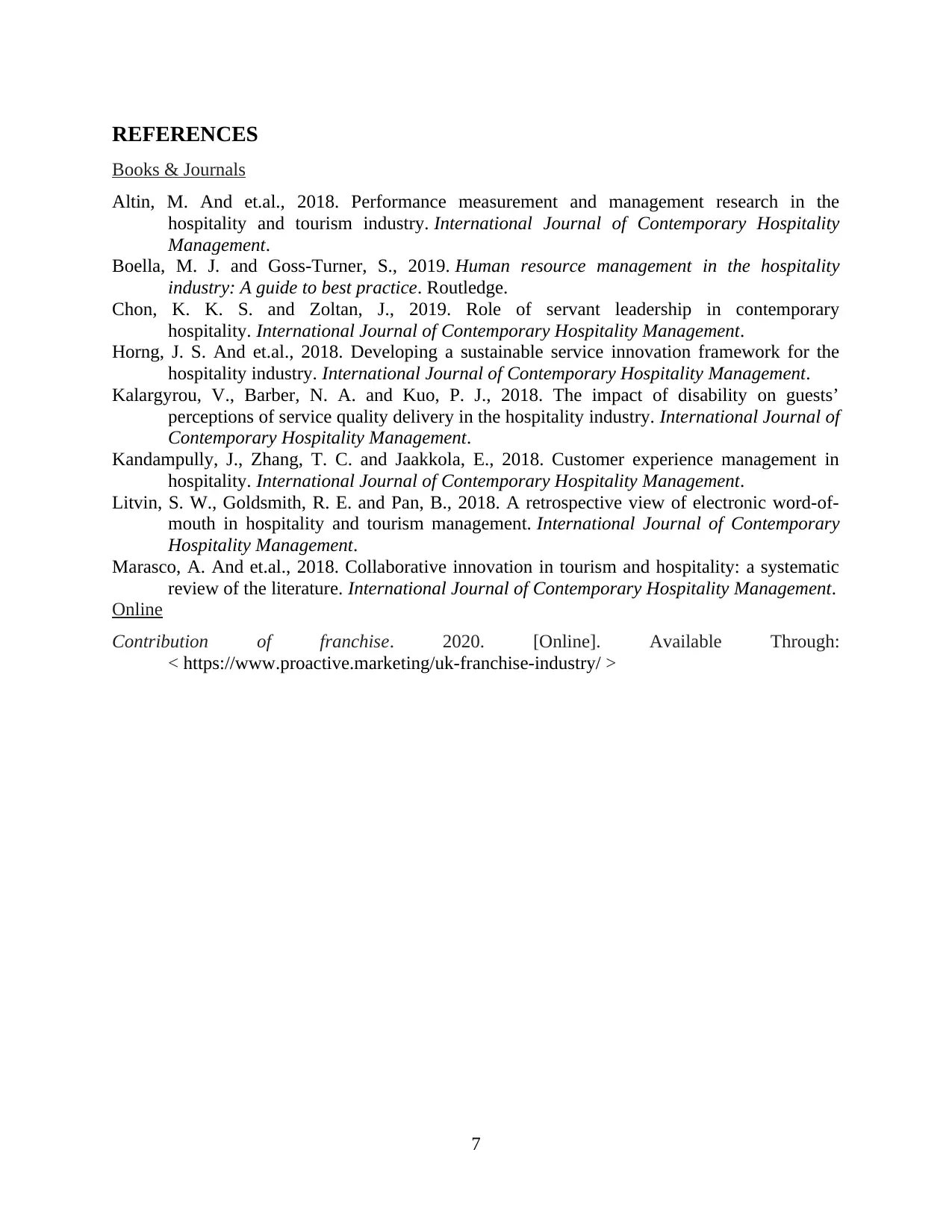
REFERENCES
Books & Journals
Altin, M. And et.al., 2018. Performance measurement and management research in the
hospitality and tourism industry. International Journal of Contemporary Hospitality
Management.
Boella, M. J. and Goss-Turner, S., 2019. Human resource management in the hospitality
industry: A guide to best practice. Routledge.
Chon, K. K. S. and Zoltan, J., 2019. Role of servant leadership in contemporary
hospitality. International Journal of Contemporary Hospitality Management.
Horng, J. S. And et.al., 2018. Developing a sustainable service innovation framework for the
hospitality industry. International Journal of Contemporary Hospitality Management.
Kalargyrou, V., Barber, N. A. and Kuo, P. J., 2018. The impact of disability on guests’
perceptions of service quality delivery in the hospitality industry. International Journal of
Contemporary Hospitality Management.
Kandampully, J., Zhang, T. C. and Jaakkola, E., 2018. Customer experience management in
hospitality. International Journal of Contemporary Hospitality Management.
Litvin, S. W., Goldsmith, R. E. and Pan, B., 2018. A retrospective view of electronic word-of-
mouth in hospitality and tourism management. International Journal of Contemporary
Hospitality Management.
Marasco, A. And et.al., 2018. Collaborative innovation in tourism and hospitality: a systematic
review of the literature. International Journal of Contemporary Hospitality Management.
Online
Contribution of franchise. 2020. [Online]. Available Through:
< https://www.proactive.marketing/uk-franchise-industry/ >
7
Books & Journals
Altin, M. And et.al., 2018. Performance measurement and management research in the
hospitality and tourism industry. International Journal of Contemporary Hospitality
Management.
Boella, M. J. and Goss-Turner, S., 2019. Human resource management in the hospitality
industry: A guide to best practice. Routledge.
Chon, K. K. S. and Zoltan, J., 2019. Role of servant leadership in contemporary
hospitality. International Journal of Contemporary Hospitality Management.
Horng, J. S. And et.al., 2018. Developing a sustainable service innovation framework for the
hospitality industry. International Journal of Contemporary Hospitality Management.
Kalargyrou, V., Barber, N. A. and Kuo, P. J., 2018. The impact of disability on guests’
perceptions of service quality delivery in the hospitality industry. International Journal of
Contemporary Hospitality Management.
Kandampully, J., Zhang, T. C. and Jaakkola, E., 2018. Customer experience management in
hospitality. International Journal of Contemporary Hospitality Management.
Litvin, S. W., Goldsmith, R. E. and Pan, B., 2018. A retrospective view of electronic word-of-
mouth in hospitality and tourism management. International Journal of Contemporary
Hospitality Management.
Marasco, A. And et.al., 2018. Collaborative innovation in tourism and hospitality: a systematic
review of the literature. International Journal of Contemporary Hospitality Management.
Online
Contribution of franchise. 2020. [Online]. Available Through:
< https://www.proactive.marketing/uk-franchise-industry/ >
7
1 out of 10
Related Documents
Your All-in-One AI-Powered Toolkit for Academic Success.
+13062052269
info@desklib.com
Available 24*7 on WhatsApp / Email
![[object Object]](/_next/static/media/star-bottom.7253800d.svg)
Unlock your academic potential
© 2024 | Zucol Services PVT LTD | All rights reserved.




